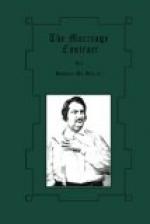“But,” he said, as he ended, “will you have the courage to sell your house?”
“Undoubtedly,” she replied.
Madame Evangelista did not choose to tell her notary the motive of this heroism, which struck him greatly. Solonet’s zeal might have cooled had he known that his client was really intending to leave Bordeaux. She had not as yet said anything about that intention to Paul, in order not to alarm him with the preliminary steps and circumlocutions which must be taken before he entered on the political life she planned for him.
After dinner the two plenipotentiaries left the loving pair with the mother, and betook themselves to an adjoining salon where their conference was arranged to take place. A dual scene then followed on this domestic stage: in the chimney-corner of the great salon a scene of love, in which to all appearances life was smiles and joy; in the other room, a scene of gravity and gloom, where selfish interests, baldly proclaimed, openly took the part they play in life under flowery disguises.
“My dear master,” said Solonet, “the document can remain under your lock and key; I know very well what I owe to my old preceptor.” Mathias bowed gravely. “But,” continued Solonet, unfolding the rough copy of a deed he had made his clerk draw up, “as we are the oppressed party, I mean the daughter, I have written the contract—which will save you trouble. We marry with our rights under the rule of community of interests; with general donation of our property to each other in case of death without heirs; if not, donation of one-fourth as life interest, and one-fourth in fee; the sum placed in community of interests to be one-fourth of the respective property of each party; the survivor to possess the furniture without appraisal. It’s all as simple as how d’ye do.”
“Ta, ta, ta, ta,” said Mathias, “I don’t do business as one sings a tune. What are your claims?”
“What are yours?” said Solonet.
“Our property,” replied Mathias, “is: the estate of Lanstrac, which brings in a rental of twenty-three thousand francs a year, not counting the natural products. Item: the farms of Grassol and Guadet, each worth three thousand six hundred francs a year. Item: the vineyard of Belle-Rose, yielding in ordinary years sixteen thousand francs; total, forty-six thousand two hundred francs a year. Item: the patrimonial mansion at




